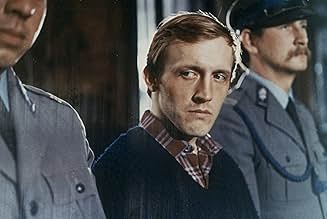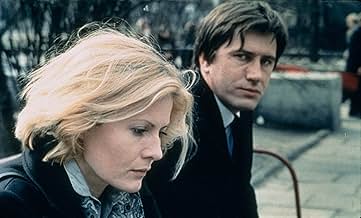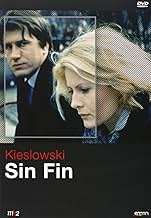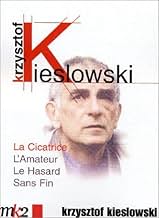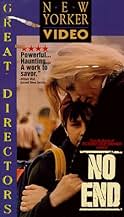AVALIAÇÃO DA IMDb
7,3/10
6,1 mil
SUA AVALIAÇÃO
A esposa do advogado recentemente falecido tenta lidar com a dor de sua perda e manter seu último caso no tribunal.A esposa do advogado recentemente falecido tenta lidar com a dor de sua perda e manter seu último caso no tribunal.A esposa do advogado recentemente falecido tenta lidar com a dor de sua perda e manter seu último caso no tribunal.
- Direção
- Roteiristas
- Artistas
Danny Webb
- American
- (as Daniel Webb)
Jacek Domanski
- Dzialacz opozycji
- (não creditado)
- Direção
- Roteiristas
- Elenco e equipe completos
- Produção, bilheteria e muito mais no IMDbPro
Avaliações em destaque
The narrative in this film is far too flawed. There are two intertwining halves of it, one good, one poor. The good one involves a woman, Ulla, whose husband died suddenly and unexpectedly one morning while he waited in his car to take their son to school. Now he gently haunts his family as they deal with the pain. The acting is magnificent here. Kieslowski is masterful at directing his actors in material like this, as he would show a million different times in The Decalogue, made a few years later. There are a few outrageously and subtly powerful scenes. Most memorable is the one where Ulla decides to prostitute herself to a British tourist. This happens about a month after her husband has died. After the man has sex with her, she asks him if he speaks Polish. He says no, and then she begins to talk about her problems in Polish. The other half of the plot is utterly weak in comparison. The husband was a lawyer, and the defendant in the case he was working on is screwed because of the death. The defendant's wife comes to Ulla for help, and though she is refused help at first, Ulla eventually introduces her to her husband's mentor, a cynical old man about to be kicked out of the business. Perhaps it's just my aversion to lawyer and courtroom dramas, but I just didn't care a lick what happened in this part of the plot. Supposedly it's meant as a criticism against the Communist law at the time. I don't know. It's dull whatever it is. But the film is slightly worth watching, especially for the acting. Even in the parts that I didn't care for, the acting is exquisite. 7/10.
What has been seen of Krzysztof Kieslowski (almost all his films and 'Dekalog' in its entirety) all ranges between very good (the 8th episode of 'Dekalog') to masterpiece ('Three Colors: Red' and 'Blue' and the whole 'Dekalog' series). To me, he was an immensely gifted director, who died far too early.
'No End' is not one of Kieslowski's best, but like 'Camera Buff' it is another early film of his that deserves more love and attention. It may be alienating and strange to some viewers (its, as reasoned, pro-solidarity sentiments must have been reason enough for it to not be released internationally for over a year) and his more international work is somewhat more accessible. However, while some of the political story could have had more clarity in places, 'No End' is great in many ways with all the typical Kieslowski strengths that make his films so good.
As was always the case in Kieslowski's work, 'No End' is made exceptionally. As well as being beautifully shot with atmospheric use of colour to match the mood, it is gritty yet beautiful with many thoughtful and emotionally powerful images and little things lingering long into the memory. Kieslowski's direction is quietly unobtrusive, intelligently paced and never too heavy. The music is suitably intricate.
It's a thought-provoking film in writing, as ever thematically rich and with complex characters, and resists the trap of rambling. The 3-part story is intriguingly told, and while the political story could have done with more clarity the emotional story is harrowing and affecting and the metaphysical story fascinating. 'No End' is always engaging and suitably challenging. The acting is as always from Kieslowski marvellously nuanced and natural, especially from heart-wrenching Grazyna Szapolowska.
Summing up, not among the best work of Kieslowski but deserves more love as a result of being overshadowed by his later stuff from 'Dekalog' onward. 9/10 Bethany Cox
'No End' is not one of Kieslowski's best, but like 'Camera Buff' it is another early film of his that deserves more love and attention. It may be alienating and strange to some viewers (its, as reasoned, pro-solidarity sentiments must have been reason enough for it to not be released internationally for over a year) and his more international work is somewhat more accessible. However, while some of the political story could have had more clarity in places, 'No End' is great in many ways with all the typical Kieslowski strengths that make his films so good.
As was always the case in Kieslowski's work, 'No End' is made exceptionally. As well as being beautifully shot with atmospheric use of colour to match the mood, it is gritty yet beautiful with many thoughtful and emotionally powerful images and little things lingering long into the memory. Kieslowski's direction is quietly unobtrusive, intelligently paced and never too heavy. The music is suitably intricate.
It's a thought-provoking film in writing, as ever thematically rich and with complex characters, and resists the trap of rambling. The 3-part story is intriguingly told, and while the political story could have done with more clarity the emotional story is harrowing and affecting and the metaphysical story fascinating. 'No End' is always engaging and suitably challenging. The acting is as always from Kieslowski marvellously nuanced and natural, especially from heart-wrenching Grazyna Szapolowska.
Summing up, not among the best work of Kieslowski but deserves more love as a result of being overshadowed by his later stuff from 'Dekalog' onward. 9/10 Bethany Cox
...and not much of a middle, either. Beginning's pretty good, though. Is it just me or is TCM Imports, under Alicia Malone, grimly determined to show every single heavy, stolid, dull, depressing film from Mr. Kieslowski? Just one solid, grey, bleak, enervating shroud until I finally cried "wystarczajaco" right around the time Antec's lovely, grieving widow, for reasons best known to Kieslowski and herself, decides to sleep with a random English dude she picks up in a bar. If I were a cynical sort I'd say that the dour Pole had a commercial side to his foreboding personality as I'm sure the sight of Grazyna Szapolowska's luscious bod did not exactly discourage ticket sales. God knows, you need something to quicken the ol pulse as you watch this bloodless bunch, cigarettes stuck firmly in their mugs, stare into the abyss, weep, occasionally crack a bitter joke and stare some more. For awhile, I was hoping that there would be some courtroom drama since the plot seemed to involve a lawyer trying to free a political prisoner. But at the film's halfway mark nary a judge, jury or executioner were to be found. Unless, of course, you see Kieslowski as the hangman of all that is dramatically compelling. C plus.
Grazyna Szapolowska's husband dies. He was a public defender, so she tries to arrange for his last client, Artur Barcis, to have a good defendant. She arranges for Aleksander Bardini, under whom her husband had apprenticed, to take the case. Barcis is accused of having led an illegal strike, and Bardini works to have him tread the middle ground of confessing and denial.
Krzysztof Kieslowski's movie is a murky one that tells us we can never tell what is going on at the moment. Only in retrospect can we figure out what was going on, and even that may not be true. It is a gloomy movie, with a lot of motivation left unclear. Did Miss Szapolowska really love her husband? Why has Bardini, who hasn't taken a case of this sort for more than 30 years, taken this one? What was the strike actually about? That remains uncertain, even after the movie's end.
Krzysztof Kieslowski's movie is a murky one that tells us we can never tell what is going on at the moment. Only in retrospect can we figure out what was going on, and even that may not be true. It is a gloomy movie, with a lot of motivation left unclear. Did Miss Szapolowska really love her husband? Why has Bardini, who hasn't taken a case of this sort for more than 30 years, taken this one? What was the strike actually about? That remains uncertain, even after the movie's end.
Although there is the obvious plot of the grieving wife, the movie is really about Poland under martial law. Probably unable to directly focus on such political topics, Kieslowski attempts to 'hide' this other side beneath a twisted Ghost subplot.
A dark movie, one that demands attentive viewing, this one will probably never be as successful as some of Kieslowski's other works, which have probably led its viewers to pick up this one.
A dark movie, one that demands attentive viewing, this one will probably never be as successful as some of Kieslowski's other works, which have probably led its viewers to pick up this one.
Você sabia?
- CuriosidadesThe film takes place in 1982.
- Citações
[First lines]
Antek Zyro: [speaking directly to the camera] I died - four days ago.
Principais escolhas
Faça login para avaliar e ver a lista de recomendações personalizadas
- How long is No End?Fornecido pela Alexa
Detalhes
Contribua para esta página
Sugerir uma alteração ou adicionar conteúdo ausente


